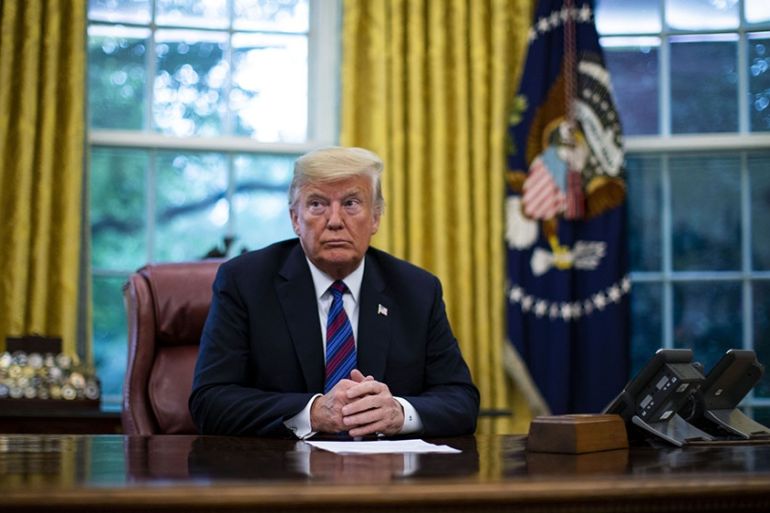Trump seeks to change how poverty is defined
US Senate Democrats are cautioning the president against marginalising poor Americans.

Senate Democrats – including a half-dozen presidential candidates – are warning President Donald Trump that a proposal to change the way the government determines the national poverty threshold would “undermine the economic security of our country’s most at-risk citizens.”
In a letter sent Tuesday, a group of 43 senators accuse the Trump administration of “looking for ways to shrink the services” accessible to the nation’s poorest citizens.
Keep reading
list of 4 itemsThirty years waiting for a house: South Africa’s ‘backyard’ dwellers
Photos: Malnutrition threatens future Afghan generations
From prisoner to president in 20 days, Senegal’s Diomaye Faye takes office
The change, proposed last month in a regulatory filing, would alter how inflation is calculated in the “official poverty measure.” The formula has been used for decades to determine whether people qualify for certain federal programs and benefits.
The lawmakers also said Congress has repeatedly enacted standards assuming the changes would not be made, and they called on the White House to not “unilaterally lower” standards that would take health coverage and assistance from Americans.
The measure, first set in the 1960s, is calculated at three times the cost of a minimum food diet and adjusted every year as prices rise. In 2018, a family of four making no more than $25,900 was considered impoverished. The figure determines eligibility for a wide swath of federal, state, and non-profit programs — including Medicaid and food stamps.
By changing the index, the poverty level could rise at a slower rate.
One proposal the Office of Management and Budget suggested in the filing is to shift to so-called chained CPI, which regularly shows a slower pace of price gains than traditional measures. Chained CPI shows slower inflation growth because it assumes consumers will substitute less expensive items when prices for specific individual goods increase significantly.
An administration official said the inflation measure was worth re-evaluating because it has remained unchanged for 40 years, and knowledge of how cost-of-living increases are calculated has increased substantially in that time. The official requested anonymity to describe the internal evaluation at OMB.
But Democrats said the change would underestimate hardship and could decrease the accuracy of the poverty measure. Signatories to the letter, prepared by Senator Bob Casey of Pennsylvania, include Democratic presidential candidates Kirsten Gillibrand of New York, Elizabeth Warren of Massachusetts, Cory Booker of New Jersey, Bernie Sanders of Vermont, Kamala Harris of California and Amy Klobuchar of Minnesota.
The White House has pushed for a re-examination of welfare programs in recent months, after Trump signed an executive order calling on federal agencies to more strictly enforce current work requirements for welfare recipients and to propose additional, more stringent requirements that could further reduce eligibility.
“Millions of able-bodied, working-age adults continue to collect food stamps without working or even looking for work,” Trump said in December. “Our goal is to move these Americans from dependence to independence, and into a good-paying job and rewarding career.”
This isn’t the first time a White House has considered using chained CPI to bring down the cost of government programs. President Barack Obama in 2014 proposed switching cost-of-living adjustments in Social Security and other retirement programs to the index.
Congressional Democrats responded with an uproar, causing Obama to abandon the proposal in later budgets.